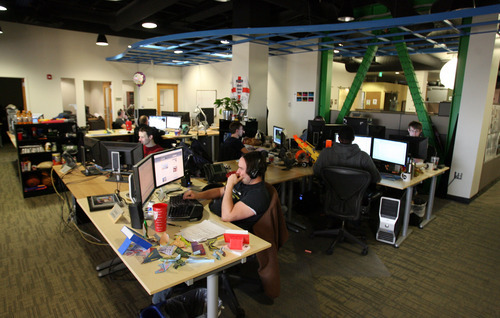This is an archived article that was published on sltrib.com in 2012, and information in the article may be outdated. It is provided only for personal research purposes and may not be reprinted.
Utah ranks favorably in a new study that compares the total tax burden levied on old and new corporations across all 50 states.
The 200-page "Location Matters" places Utah sixth from the top in terms of lightest tax burden for mature firms (10 years old and up) and 10th overall for newly established firms that qualify for incentives.
Its promoters say the research will be an invaluable tool for companies, but others wonder whether the numbers tell the whole story.
Compiled by the Washington, D.C.-based Tax Foundation and KPMG LLP, a global audit and tax firm, the study uses seven hypothetical firm models — corporate headquarters, research and development facilities, retail stores, call centers, distribution centers, capital-intensive manufacturing and labor-intensive manufacturing.
Current Taxes factored into the total rate include corporate income, property, sales, unemployment insurance, capital stock, inventory and gross receipts. For new firms, incentives include new job credits, investment credits, research and development credits, payroll and withholding tax rebates, and property tax abatements.
In a recent conference call, Tax Foundation president Scott Hodge described the study as "one of the most extensive comparisons of real-world corporate tax costs that's ever been undertaken."
Highs and lows • "Paying corporate taxes is a lot like buying cars," Hodge said. "Everyone seems to pay a different price." However, he believes the state-to-state comparisons will prove useful.
"We're zeroing in on the firm-level or bottom-line question that we often get from business owners: How much will my company pay in taxes?"
According to the study, Wyoming had the lowest overall tax burden for mature firms, while Pennsylvania had the highest. For new firms, Nebraska had the lightest hit, while Hawaii had the heaviest.
Utah enjoys a relatively low 5 percent corporate income tax rate, but five states — including neighbors Nevada and Wyoming — levy no corporate income tax.
What do the numbers really say? • Bob Springmeyer, a principal with the Salt Lake City-based consulting firm Bonneville Research, said the study confines itself to a narrow perspective.
"Wyoming comes out on top because it has no corporate income tax and its other taxes are low. They get all their money from oil, gas and coal. But you don't find businesses wanting to locate there."
When Utah faced fierce competition in 2010 to land the contract for the National Security Agency data center at Camp Williams, its favorable energy costs, Internet infrastructure, vibrant software industry and proximity to the Salt Lake City International Airport won the day, not its tax appeal, he argued.
Springmeyer said there was another factor. "Utah ranks low in terms of wages. You can hire good, hardworking, well-educated, dependable people here for less than in most places."
How much do taxes matter? • The study reinforces that Utah knows how to "keep government out of the wallet of business," said Christopher Conabee, managing director for corporate recruitment in the Governor's Office of Economic Development (GOED).
Conabee believes that Utah's post-performance incentives pose less risk than up-front financial enticements offered elsewhere. Companies recently tapping the state's incentives include IM Flash Technologies, eBay, Adobe, Procter & Gamble and Goldman Sachs.
Adobe's website touts its Orem location as a place where employees enjoy diverse seasons, landscapes and recreational opportunities that make it "possible to mountain bike, golf, water ski, and snowmobile — all in one day."
"When you look at Utah's total package, that's why we continue to have great business growth," Conabee said.
Electronic Arts, a multinational digital game developer, moved into its state-of-the-art Salt Lake City studio from another Utah location in 2010. Its website lauds Utah's two professional sports teams and world-class ski resorts.
Jon Dean, EA's executive producer, said his high-tech studio received no incentives to set up shop in the city's downtown.
"Utah has a lot going for it," Dean said, noting that high-paid "gamers" can work anywhere in the world.
The state's talented workforce, its business-friendly government, his company's "pipeline" with Utah universities — and the fact that light-rail trains will soon supply service to the airport are all reasons Dean values being here.
"Creativity and innovation seem to be priorities for the state," he added.
Royce Van Tassell, vice-president of the Utah Taxpayers Association, believes the study underscores Utah's sound tax policies.
"This is the latest in a long line of studies that indicate that Utah is a very business-friendly environment, where people can come, find good jobs, raise their families and have a good quality of life," Van Tassell said.
Not everyone gets a break • For others, the low-tax lure is not as certain. The study "proved what everyone knows — that taxes vary widely," said Michael Mazerov, senior fellow with the Washington, D.C.-based Center on Budget Policy and Priorities. "They haven't shown whether tax burdens matter."
Taxes help enhance the business environment by funding better police protection, schools, roads and university lab facilities, Mazerov added, and those factors influence where companies choose to locate.
Over the past decade, Utah is one of only two states that did not suffer a net manufacturing jobs loss, even though it ranks midway in terms of taxing such firms.
The Tax Foundation views the lowest possible taxes on business as a good thing, Mazerov added, expecting their report to stimulate further competition between the states. However, the homegrown mom-and-pop shops could suffer as a result.
"More incentives to lure the next big plant often result, in the long term, in higher taxes for small businesses who don't get those breaks," Mazerov said.
Matt Gardner, executive director for the Washington, D.C.-based Institute on Taxation and Economic Policy, believes the study's parameters "only tell you so much. They're basically rough guidelines. One company may pay [taxes], while another — due to tax breaks or pattern of production — won't pay anything close."
Gardner would prefer that states close corporate loopholes rather than boosting tax breaks.
"This report could be helpful if you're a company that wants to make your location decision based entirely on tax rates," Gardner said. "The question is whether any business operates that way."
twitter: @catmck —
Overall corporate tax rate: Utah's rank among the 50 states
Corporate headquarters • New 17th lowest, mature 11th lowest
Research and development facility • New 11th, mature 7th
Retail store • New 12th, mature 6th
Call center • New 14th, mature 18th
Distribution center • New 3rd, mature 11th
Capital-intensive manufacturing • New 22nd, mature 21st
Labor-intensive manufacturing • New 16th, mature 26th
Overall • New 10th, mature 6th
Source: Location Matters study, http://www.taxfoundation.org







